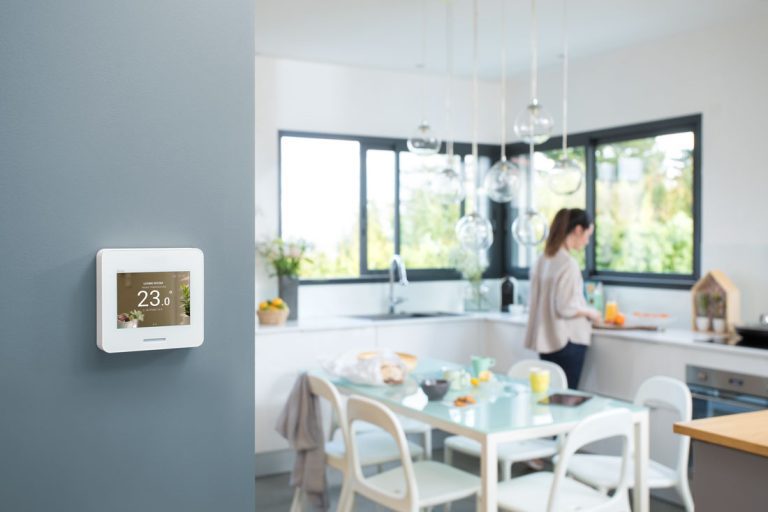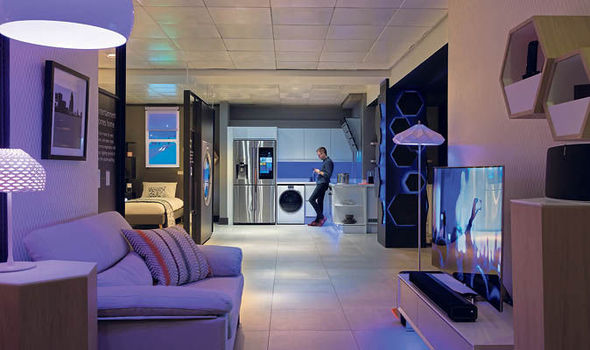In recent years, there’s been a growing trend in smart technology for the home, with many homeowners upgrading their properties with all sorts of internet enabled features and devices that can be operated from a single interface such as a smartphone or tablet. Increasingly, contemporary homes have heating thermostats and lighting controls that can be operated and adjusted from anywhere, WiFi connected security systems with live video footage that can be viewed remotely and, of course, all manner of smart appliances including TVs, fridge freezers and dishwashers that can be controlled via a smartphone app or smart speaker devices like Amazon Alexa or Google Nest. According to recent survey findings, 57% of homes in Britain now contain at least one smart device, and there are 2.22 million homes in the UK with at least two smart devices. For sure, smart homes are the future, however most features are retrofitted after construction. With the current drive to substantially increase the nation’s housing stock in full swing, why are UK housebuilders not integrating more smart technology into new builds right from the design stage? Let’s take a look at some of the most common hurdles. Higher build cost: A complete smart home system can add 5% to the cost of the build with an unproven return on the investment for housebuilders in a highly competitive market. It’s a financial risk many developers are unwilling to take. What’s more, building a home with smart technology requires niche skills, materials and methodologies that are comparatively new to the housing industry, adding time and cost to the process. New ways of cooperating between smart home professionals, architects and site managers are required. Security concerns: According to industry figures, 86% of real estate pros are concerned about cyber attacks and the risk of hacking with smart home technology is on the increase. The more smart features and devices are used, the greater the vulnerability to the householder. Outdoor devices with embedded computers that have little in the way of security protocol pose the greatest risk, such as garage door openers and wireless doorbells are a case in point. Weak communication protocols and configuration settings may also be an issue for smartphone app controlled devices such as personal home assistants, smart thermostats and even baby monitors. Software problems: Software integration can become a real issue for systems that use incompatible technologies and won’t ‘speak’ to each other, or are unable to accommodate additional connections further down the line. With the co-existence of various communication protocols as the proliferation of ever more sophisticated smart devices continues, there is no guarantee that the latest tech used today won’t be obsolete in a few years’ time Again, it’s a financial risk that many housebuilders will want to avoid. On the other hand, it is clear that the emergence of smart home technologies over the last 20 years can no longer be considered a passing phase. Home automation has steadily increased in popularity since the early 2000s, and it might be unwise for the UK housebuilding industry to ignore this fast-growing demand among consumers wanting the latest technology in their homes. Here are some of the main benefits of smart new builds: Smart homes sell faster than comparative properties without the added features, and they fetch premium prices too, particularly among younger homebuyers. Survey findings show that 61% of millennials would pay extra money to live in a home with smart features. Reliable long-term performance of smart home systems is best achieved via upfront integration. Designing the entire system at the beginning will ensure smoother and more efficient operations as opposed to the piecemeal retrofitting of individual features. Greater vigilance offered via connected devices means homeowners are alerted to problems such as burglaries or fires early. This results in fewer home insurance claims and, in turn, potentially lower premiums. Smart homes enable the homeowner to cut down on energy waste such as lights left on or rooms heated unnecessarily, by up to a third. This can help UK housebuilders meet energy efficiency standards and build more sustainable homes. Smart home technology can be particularly beneficial to physically disabled and elderly residents. Home management tasks and home security all become much easier, creating more inclusive home environments. The fact that a growing number of home buyers are now prioritising technology in the home is a clear sign that there is an opportunity to maximise future profits for the UK housebuilding industry by building more smart homes. Not only is the Internet of Things already bringing the benefits of connected living to an increasing number of people, but the next generation of property buyers are looking for homes that align with their values. From environmentally conscious and energy-efficient solutions to more interconnected communications for work and home, smart homes are able to offer all that and more.






